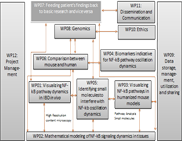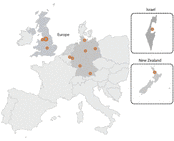About SysmedIBD

SysmedIBD stands for Systems medicine of chronic Inflammatory Bowel Disease. The project started in December 2012 and is funded with 12 Mio Euro by the European Commission under the 7th Framework Programme.
SysmedIBD brings together specialists from Europe, Israel and New Zealand and is centrally coordinated by Prof. Werner Müller at Manchester University. The main objective of SysmedIBD is to better understand chronic Inflammatory Bowel Disease and to find new approaches for therapies.
What is Inflammatory Bowel Disease?
Inflammatory Bowel Disease is a chronic inflammation of the gut. Two such diseases are ulcerative colitis and Crohn's disease. In Europe about 10 in 100.000 people suffer from ulcerative colitis and about 5 in 100.000 people from Crohn's disease. The disease can start at an early age. The disease cannot be cured and lifelong management of the disease is required. A systems medicine approach, including as much data as can be collected and incorporated into mathematical models, will allow the general practitioner, the specialist and the patient to better stratify and manage the disease.
What is Systems Medicine?
In Biology detailed mathematical models of complex biological processes were developed based on extensive experimental data. In systems medicine, such models will be applied and further developed targeted to particular diseases. The aim is to better understand disease mechanism, to develop new biomarkers, to stratify patients and to suggest personalised treatments. The patients will be diagnosed much more detailed compared to conventional approaches and co-morbities are better taken into account.
What is the Aim of SysmedIBD?
SysmedIBD has several partners working towards a systems medicine approach of Inflammatory Bowel Disease. Mathematical experts develop models describing the process of chronic inflammation starting with one central pathway present in each cell type, the NF-kb pathway. Biologists with expertise in animal models will generate data to validate the mathematical models and samples from patients will be used to match experimental data to patient cohorts. Within the consortium, specialists in chemical computing will suggest potential drugs to treat chronic inflammation and experts in nutrition will follow the outcome of diet intervention of patients with Inflammatory Bowel Disease.
On the following pages you will find more information about the group, the project and our dissemination activities as well as a contact form to get in touch with us.




